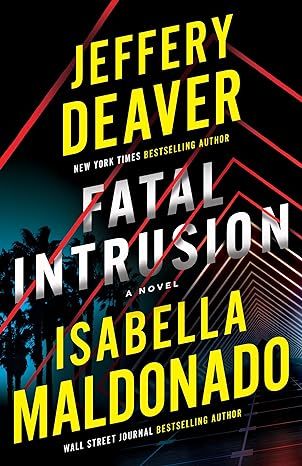Fatal Intrusion: A Novel (Sanchez & Heron)Kindle
4.5
-
3,541 ratings
As a wave of murders grips Southern California, an unlikely pair must untangle the mysterious patterns of an elusive killer. A propulsive new series by New York Times bestselling author Jeffery Deaver and Wall Street Journal bestselling author Isabella Maldonado.
Carmen Sanchez is a tough Homeland Security agent who plays by the rules. But when her sister is attacked, revealing a connection to a series of murders across Southern California, she realizes a conventional investigation will not be enough to stop the ruthless perpetrator.
With nowhere else to turn, Sanchez enlists the aid of Professor Jake Heron, a brilliant and quirky private security expert who, unlike Sanchez, believes rules are merely suggestions. The two have a troubled past, but he owes her a favor and she’s cashing in. They team up to catch the assailant, who, mystifyingly, has no discernible motive and fits no classic criminal profile. All they have to go on is a distinctive tattoo and a singular obsession that gives this chillingly efficient tactician his nickname: Spider.
Over the next seventy-two hours, Sanchez and Heron find themselves in the midst of a lethal chess match with the killer as they race to stop the carnage. As the victims mount, so do the risks. Because this spider’s web of intrigue is more sinister―and goes far deeper―than anyone could possibly anticipate.
Kindle
$1.99
Available instantly
Audiobook
$0.00
with membership trial
Hardcover
$20.29
Paperback
$12.78
Ships from
Amazon.com
Payment
Secure transaction
ISBN-10
1662518722
ISBN-13
978-1662518720
Print length
444 pages
Language
English
Publisher
Thomas & Mercer
Publication date
August 31, 2024
Dimensions
5.5 x 1 x 8.5 inches
Item weight
1 pounds
Product details
ASIN :
B0CNYGK3FV
File size :
4244 KB
Text-to-speech :
Enabled
Screen reader :
Supported
Enhanced typesetting :
Enabled
X-Ray :
Enabled
Word wise :
Enabled
Editorial Reviews
“Slick, cinematic action and fastidiously detailed investigative work bring this series launch to life. Deaver and Maldonado make a good match.” ―Publishers Weekly
“Deaver’s interest in social media and Maldonado’s law enforcement background blend well in this fast-paced crime novel.” ―Library Journal
To say I couldn’t be more excited about this new series from #1 international bestselling author Jeffery Deaver and Wall Street Journal bestselling author Isabella Maldonado would be an understatement.
Not only are Deaver and Maldonado an incredible crime-writing duo, they’ve also created an incredible crime-fighting duo. Fatal Intrusion introduces Homeland Security agent Carmen Sanchez and brilliant professor and security expert Jake Heron as they team up and race across Southern California on the hunt for a clever killer who eludes capture. The story is propulsive and jaw-dropping and had me glued to the pages. I loved Sanchez and Heron’s detailed investigation and even getting to see through the eyes of a killer. I hope you enjoy this fantastic read as much as I did. —Megha Parekh, Editor
Sample
I
MONDAY
CHAPTER 1
Walter Kemp was not about to let her escape again.
“Come out, come out, wherever you are,” he muttered in a singsong voice.
She couldn’t hear very well, but still he treaded carefully, unwilling to blunder through the dense woods and scare her off. He wanted her calm and unaware until he was good and close, so he had to be stealthy.
And deceptive. He tossed a pebble deep into the lush foliage to further disguise his position.
On the outskirts of San Diego, the secluded park felt far from civilization. And from prying eyes.
“You can’t hide forever,” he whispered. “Not from me.”
Walter, a solid man in his sixties, wasn’t the least stiff or winded by the hunt. He was nearly in the same shape as thirty years ago. A bit less hair, but so what? There were more important things in life.
Like what he was presently up to.
She had slipped away from him, forcing him to spend the past half hour stalking her. When he found her this time, he wouldn’t let her out of his sight until he was finished.
A slight rustle to his left caught his attention. Was that her? He squinted in the direction of the noise.
She peeked out from behind a bush, and his heart hammered with excitement. She was every bit as beautiful as when he had first seen her.
Catching sight of him, she froze. No matter, she couldn’t get away. “I’ve got you now.”
She hadn’t been his first, and she wouldn’t be his last, but she might be the loveliest.
He reached into his vest, thick fingers fumbling over the finely machined metal and plastic. One of the tools of his trade. Slowly, carefully, he raised his hand and took aim. He would have only one chance.
She opened her mouth wide as if to scream.
He pressed the button and held it down. At the rate of thirty shots per second, the Nikon captured ninety images—in stunning forty-five megapixels—of the Lampropeltis zonata pulchra, also known as the San Diego mountain kingsnake, before she slithered into the underbrush.
Walter had pictures of several males but had been on the hunt for an elusive female for weeks. Only careful study had allowed him to spot the subtle difference in the subcaudal scales—those under the tail—and the slightly shorter proportion compared to the overall body length that indicated the sex of the reptile.
Unlike with many other species, where the females weren’t as brightly colored as the males, all San Diego mountain kingsnakes sported alternating bands of red, black and yellow covering their bodies. The vivid display that mimicked a venomous coral snake was an illusion to scare off potential predators. This species was harmless to everything except the small mammals and lizards in its diet.
Mission accomplished, Walter covered the expensive lens and tucked the camera back into his vest. Now unconcerned about making noise, he tramped back to the trail that led to the lot at the park’s entrance.
He would much rather be walking in nature than attending yet another ground-breaking ceremony. At first, many years ago, real estate development had been exciting. His life’s passion. He had started off with a small loan and slowly parlayed it into an empire.
Things had begun to look different after over three decades in the business, however. He’d reflected on all the formerly wooded acreage he had eviscerated to turn into suburban havens, and he had started changing his practices. Last year he took up the cause of affordable housing and had been working to improve blighted areas of the community that had fallen on hard economic times. He lost money on every project but felt he’d gained back some of his soul. In addition, he could look his only child—an adult son—in the eyes again. If he was blessed with grandchildren, he would be giving them a better world.
Walter made it to the parking lot, thinking about how his son’s high school science project more than a decade ago had led them to bond over the study of reptiles and amphibians. They had both volunteered at the local herpetological society, though only Walter remained a member.
He was nearly to his car when a soft clatter drew his attention. He glanced down to see a small white ball roll past his booted feet. Mesmerized, he watched its progress as it rattled along the asphalt and disappeared under his car.
Hurried footsteps pounded up from behind, startling and unnerving him. As he turned, the blade of a heavy-duty shovel crashed down onto his head.
He cried out in shock and pain.
Stumbling, he threw his arms up in an attempt to protect himself, but another devastating blow drove him to his hands and knees. The agony was beyond anything he’d ever felt. It gripped his entire body, dulling his thoughts and slowing his reactions.
Darkness closed in as his sluggish brain tried to make sense of what was happening.
“Why?” he gasped.
Or maybe he just thought the word.
Then he pitched forward, as if in slow motion, falling face down onto the oil-stained surface of the deserted parking lot.
He sank deeper into oblivion, unable to lift his leaden arms. He managed to turn his eyes upward. The shovel was about to come down in another vicious arc, and he knew this would be the last blow.
Someone was killing him . . .
An instant before the tool struck and the void engulfed him, Walter Kemp found himself looking not at the face or torso of his attacker, but at the hands, in clear plastic gloves, gripping the shovel firmly.
Specifically, at the bold and carefully inked tattoo of a black widow spider that graced the man’s pale inner wrist.
His last image before the world went dark.
Dennison Fallow swung the shovel with all his considerable strength. The satisfying thwack of metal against bone, followed by an ominous crunch, told him his work here was done.
He paused to study his handiwork. Good.
The Push, deep within Fallow’s soul, was satisfied.
For now.
The man lying at his feet hunted snakes, but this time he’d been the one hunted. And by a far superior predator—a spider.
Various species of these creatures employed many clever means of ensnaring their prey. Some wove a web and patiently waited for an unsuspecting victim to get caught. Others constructed trapdoors or disguised themselves. Today Fallow had attacked in an ambush, like a wolf spider, among the most aggressive arachnids in the world. They don’t bother with webs. Or disguise. They charge their prey like a mountain lion.
He continued to watch Kemp for several minutes, making sure the man’s chest had stopped rising and falling. One could never be too careful.
That thought reminded him of the shovel he still gripped tightly. Though he’d worn gloves, he’d make sure he removed all traces of his presence from the handle and the shaft, because he was going to leave it behind at the scene.
After all, how could you tell a story without setting the stage?
II
TUESDAY
CHAPTER 2
Selina took another sip of the aptly named Zombie Reanimator, the house specialty at the Wicked Brew Coffee Shop across the street from Montelibre Polytechnic Institute’s Perris campus in Southern California.
She’d been holed up in the corner of the café most of the afternoon, putting the finishing touches on a chemistry thesis due tomorrow. Her professor, who by all accounts had neither a heart nor a soul, wouldn’t grant her an extension under any circumstances. According to campus lore, he had failed a student who missed the final exam, despite knowing the young man was in the hospital after a car crash, and had refused to change the grade until the university chancellor intervened.
Although Selina suspected the tale was more campus folklore than fact, she would not test the hypothesis by submitting her paper late.
“That looks pretty intense.” The male voice was smooth and deep.
Selina jumped and sat upright. Her startled gaze met the pale-blue eyes of a stranger seated at a nearby table.
“Chemistry,” she offered, somewhat flustered by the unexpected interruption. “My thesis is on covalent bonds.”
“I prefer biology.” He scooted his chair closer. “But the subjects are related. When you think about it, one can’t exist without the other.”
She estimated him to be in his early thirties, too old to be an undergrad and too young to be a tenured professor. Was he involved in postdoctoral research? She darted a glance at the folded newspaper in his hand, noting a nearly completed crossword puzzle—done in ink and without any errors.
Smart and—she sensed—supremely aware of his abilities. Interesting.
No wedding ring either.
The pressed tan cargo pants and close-fitting shirt were a notch above the jeans, rumpled T-shirts and faded hoodies favored by most of the café’s clientele. The shirt was a curious shade—an attention-getting red, a hue only somebody with self-confidence could get away with. His gray tweed sport coat didn’t obscure an athletic physique. The navy-blue baseball cap bore no logo, and what hair was visible beneath it was light colored, contrasting with the dark three-day growth that shadowed his lower face. His glasses, with round tortoiseshell frames, were stylish. He wasn’t Hollywood-leading-man handsome but had an undefinable appeal.
He glanced at her tote bag. “Any chance you have a pen I can borrow?” He held up the paper. “Naturally mine went dry just before I was done.”
Rather than carrying around the ubiquitous backpack seen everywhere on campus, Selina favored a worn gray shoulder bag. Instead of a hundred zippered—and irritating—slots, the tote had one giant compartment that held everything, including her laptop.
“Sure.” She picked up the bag and opened it wide to peer inside before plunging her hand deep into its dark recesses. “Got to be one somewhere in this black hole.”
He smiled.
Engrossed in digging through the student-related detritus at the bottom, she didn’t realize he had moved closer until his warm breath fanned the side of her face. She snapped her head up to see that he too was examining the contents of her bag.
She straightened, subtly pulling the tote closer. “I’ll find it.”
He raised his hands, palms out, in a disarming gesture. “Hey, sorry. Just trying to help.”
The boyish grin seemed genuine. Was she being paranoid? Her fingers clasped a long, cylindrical object, and she pulled it out.
“It’s a plastic cheapie,” she said. “You can keep it.”
His smile widened. “Much appreciated.”
He took the pen from her outstretched hand and turned to the puzzle. “Seven-letter word for wide-bodied tree.” Speaking only to himself, not her. “Sequoia.” He gave a half smile of satisfaction, jotted the answer and stood. Tucking the newspaper under his arm, he turned toward the door. “Good luck with your . . . bonds,” he said over his shoulder.
And then he was gone, pushing his way outside to the sidewalk.
Selina set the tote back on the chair beside her, still thinking about the brief encounter. He had seemed friendly, then ended their exchange abruptly. Had he been about to ask her out before she got possessive about her bag? He wasn’t bad looking and seemed intelligent and polite.
And he was single.
Probably.
Then she glanced up and saw him standing outside, looking back at the café. Their eyes met, his narrowing a fraction. Still smiling, he inclined his head briefly and walked away.
Turning back to her schoolwork, she reflected that however appealing he was, the chance of a date would have come in at somewhere south of zero. One look at the small black-and-red tattoo on the inside of his wrist had made the decision for her.
Spiders had always creeped her out.
CHAPTER 3
Special Agent Carmen Sanchez could not acquire a good head shot through the grimy window.
Her .40-caliber SIG Sauer P229R pistol was up to the task—as was she—but the pane of glass would deflect the hollow-point slug enough to send the round who knew where, potentially wounding or killing one of the hostages.
“I know what you’re thinking, Sanchez,” the California Highway Patrol lieutenant said through the transmitter bud in her ear. “And you’d damned well better not do it.” A brief pause followed. “Those shots are for snipers with spotters and big-ass long guns.”
But the sniper and spotter and rifle weren’t in place yet, and the hostages were in danger now. Jason Powell was currently holed up inside a ramshackle minicompound in the town of Ario, located in the Mojave Desert. He was backed into a corner, desperate, armed and mentally unstable.
Carmen had arrived at the scene less than ten minutes earlier. She’d pinned her long black hair up to keep her field-to-target view unobstructed and surveyed the area carefully.
Normally an agent with the Department of Homeland Security would not be among the first to arrive at a standoff in the middle of nowhere, but she had been on Powell’s trail for two days when the call for assistance came out from the Ario police chief that he’d been spotted here. She’d made a beeline, beating the cavalry by half an hour and doing her own recon.
The California Highway Patrol was just setting up, and Lieutenant Kevin Albright, who headed the Mojave-area office, had taken charge of the scene as the incident commander. Carmen, however, was a DHS special agent assigned to Homeland Security Investigations. A federal HSI agent did not fall under Lieutenant Albright’s command, a fact that seemed to be causing him serious heartburn.
“And you’re too close,” Albright added, his sharp words carrying through her earbud. “Powell has a shitload of iron in there. M4s, Glocks, SIGs. You go down, I’ve got to risk my people to drag you out.”
Albright and several CHP troopers had established a command post about two hundred feet back. The lieutenant was surveying the scene—and Carmen herself—through expensive binoculars.
She had been the one to advise the Ario police chief, Gregory Smits, about Powell and his armory before taking up a forward position behind a crumbling concrete wall fifty feet from the compound. Apparently Smits had briefed Albright when he arrived, and now the lieutenant was regurgitating the very intel she had already provided.
“And a case of C-4, Semtex and some other high explosives,” Carmen said. “This guy’s a genius with IEDs.”
Exactly her earlier words to Smits, which he had undoubtedly used in briefing Albright.
Her comment, blunting the man’s know-it-all attitude, was met with a few choice expletives, and she knew he had gotten her point.
“I’ll maintain position until your SWAT team is in place, Lieutenant,” she added. “But if I see a way to end this before then, I’m going to take it.”
She weathered a barrage of threats from Albright that included everything from filing a formal complaint with the DHS Secretary to throwing her in jail.
Unfazed, Carmen ignored the diatribe and continued to study the compound, noting every square inch within sight. When Albright ran out of steam, she picked up her narrative as if he hadn’t spoken: “And tell the tac team Powell loves to use fishing line for his booby traps. Nearly invisible. As for bargaining, the negotiators should know he has a history of faking surrender before an attack. One of his favorite tricks.”
There was a long silence. She imagined Albright deciding she may have useful intel after all and that he should pass along the information to the teams before they engaged.
“What else can you tell us?” Albright’s tone had grown distinctly less hostile.
“Powell’s a conspiracy theorist and a recluse. He used to be on meds, a lot of them, but he became anti-pharma. Now he’s also anti-technology, anti-capitalist and anti-government too. Last week he planted a bomb at the corporate headquarters of a tech company in Glendale, protesting one of its acquisitions. Negotiators tried to talk him down, but he kept ranting about Big Tech forming a cabal to control the world.”
“We received a DHS bulletin about an unknown subject protesting a merger, but I didn’t hear about any bangs.”
“That’s because the robots managed to cut the blue wire or the yellow wire, or whatever, in time,” she said. “But Powell got away while they were rendering safe.”
“Why the hell am I just hearing about this now?” Albright had gone back to hostile, which seemed to be his default setting. “His name and face should have been plastered on a nationwide APB.”
“We didn’t have his name yet. He was just a DomTerr unsub. Powell’s been living off the grid and restricting himself to the dark web for years. He wasn’t in any face-rec or DNA databases, and it took us until this morning to ID him.”
“You have eyes on the hostages?” Albright asked.
“Hard to see through the window, but it looks like a man and woman. Both appear to be White and in their forties. Scared but unharmed.”
“Hold on a sec,” Albright said. He carried on a one-sided conversation through what would be his phone. He returned to Carmen. “Okay. We just got a call—a married couple fitting that description was carjacked just north of Glendale yesterday.” He paused. “I can’t make any vehicles. You?”
She scanned. “No.”
“He ditched their wheels somewhere nearby and forced them to walk here. Man, in this heat.”
A shout from inside the building ended their discussion. Squinting, Carmen saw the male hostage on his feet and moving forward, arms lifted, railing against their captor, Powell. With surprising speed, Powell spun his assault rifle and smashed the stock into the man’s ribs. He collapsed out of her line of vision, but she could see Powell shoulder the weapon and train the barrel downward, evidently pointing at the man. The imminent threat—and the woman’s wail of terror splitting the air—spurred Carmen to act. With no viable target through the window, she decided to take a chance on the plan that had been forming in her mind.
She stood.
“Where are you going?” Albright said, the alarm in his voice evident through the transmitter.
“Pay Powell a visit.”
Albright surely would run the scene by the incident commander playbook. Secure the perimeter and start negotiations. That could go on for days. However, Powell wasn’t a typical hostage-taker; he was like a cult leader. He had followers, fanatics. As soon as they learned of the standoff, they might pay a visit and start sniping at the officers from the nearby hills. Suicide attacks were a distinct possibility.
This had to end now.
Disregarding the lieutenant’s protests, she strode to her SUV, a chunky, black Chevy Suburban, and opened the liftgate. It took mere seconds of digging through her nylon equipment bag to find what she was looking for.
“Sanchez, no! The tac unit’s suiting up and getting bomb gear ready. They’ll be good to go in less than ten minutes.”
She jogged back to the wall and surveyed the compound again, noting angles and lines of sight. Crouching, she started forward.
“Stand down,” Albright bellowed. “That’s an order.”
She veered to the left, circling around behind the building, ready to respond if Powell appeared in either of the greasy windows—logical shooting nests.
“The instant you try to breach the back door, he’ll tap ’em,” Albright muttered. “And it’s got to be wired with C-4 up the ass. You’ll get everyone killed—including yourself. Stand. Down.” His voice rose to a shout. “Now.”
Staying low, she trotted to the back door and removed the canister she had retrieved from her SUV. She twisted the nozzle and placed it on the ground facing a small vent. Unlike the others, Carmen had been close enough to hear a low hum coming from the main building. She realized that Powell would have come up with a way to deal with the heat. This was, after all, the Mojave Desert. Temperatures inside the closed building would be fatal—unless he’d devised a way to cool the place without county electrical service. Easy for someone who had spent years living off the grid.
She hadn’t spotted a generator, so Powell must have installed solar panels or lithium batteries to power a unit. Either way required some sort of airflow to and from the outside.
Keeping below window level, she scuttled around to the front corner of the building and pulled out a roadside flare from her waistband at the small of her back. She popped off the plastic cap, turned it over, and struck the rough surface against the end to ignite the flare.
The sizzling orange-and-yellow flame was impressive.
“Holy shit, Sanchez,” Albright said. “Are you setting the damn building on fire?”
She tossed the burning flare to the ground near the front door and darted back to her previous position behind the wall before interrupting Albright’s tirade.
“Give me four, five minutes, Lieutenant,” she said. “And this will be done.”
“Yeah, right. Like Waco. Where everybody died.��”
She offered no reply. The newly arrived tac team members began their deployment, creeping around the perimeter in stealth mode. The hiss of the flare was the only sound to break the thick silence of a desert on a windless day.
She gasped when a gloved hand slammed down on her shoulder, then spun her around. She had to tilt her head back to take in the giant, decked out in full tactical regalia. Albright had obviously sent the largest operator he could find to shut her down.
SWAT team members didn’t speak when setting up for entry, and the giant did not break protocol. He didn’t have to. The message was clear in his dark eyes, which were narrowed to angry slits: she was a rogue agent who had likely just caused the deaths of two innocent captives.
Even at five seven with a solid, athletic build, Carmen was no match for a man more than a foot taller and probably eighty pounds heavier. The giant shoved her to her belly, put a knee on her back and muscled her wrists together, zip-tying them.
“You can’t be serious,” she called out, loud enough for Albright to hear over the comm.
No response.
“You do not want to do this.” Though Carmen’s voice was low and threatening, it had no effect.
He jerked her to her feet and frog-marched her toward the command post, his right hand fiercely gripping her left biceps. She didn’t resist. He was just following orders. Besides, her work here was done.
They got twenty feet before he stopped in his tracks and pivoted. The tactical team would be on a different frequency, and she could not hear the transmission. But he’d apparently been given new instructions.
He loosened his grip and Carmen jerked her arm away. She turned to peer at the compound.
The two hostages, followed by Jason Powell, were filing out of the building with their hands in the air. Powell held no weapon.
“Stop where you are,” the tactical team leader, a wiry woman in her mid-thirties, shouted at them. “Lift your shirts and turn around in a complete circle.”
Rather than converge on the threesome, the SWAT team was making sure none of them were wired with explosives set to detonate when they were close to the police. All three of them complied.
“Walk backward toward my voice until I tell you to stop,” the team leader continued.
The tac supervisor was taking no chances. Powell could have rigged an IED with a proximity sensor to detonate when anyone approached, or he could have wired the entire building to blow with a timer. Given either of those possibilities, they were making sure everyone involved put distance between themselves and substances that detonated at thirty thousand feet per second.
Her captor’s sausage-like fingers returned to Carmen’s arm. She wasn’t out of the penalty box yet. Blowing out an impatient sigh, she watched the rest of the team separate the hostages from Powell, who was pushed to the ground, sending up a plume of dust.
“You’re all tools!” he shouted as rough hands patted him down. “Nothing more than armed tax collectors in the service of big government and big business. How does it feel to be used?”
She had researched Powell and had read some of his rambling manifestos but hadn’t heard him in person. The frenzied delivery was unsettling, even if the messages weren’t original.
“The government sold us out,” he continued, voice rising in volume and tempo. “DrethCo merging with Brakon? Oh, you’ll see! That’ll be it!” He gazed around, wild eyed, a manic grin on his face. Spittle flew as he shouted, “Learn history or be doomed to repeat it. Look at Hitler, look at Stalin. This is a hundred times worse!”
As Powell continued to rant about conspiracies, corporate greed and privacy breaches, Lieutenant Albright, a broad-chested, muscular man roughly her height, strode toward the giant who still held Carmen firmly in place. He stopped close to her. The grim satisfaction etched on his features told her he was enjoying her predicament.
“Show’s over,” she said. “You can let me go now.”
The lieutenant jabbed a finger at her. “You got lucky, Sanchez. But the only place you’re going is in the van next to Powell. Your supervisor can bail you out of jail. Reckless endangerment, assault, criminal negligence. And that’s just for starters.”
This was getting tiresome. Time to explain. “No one was ever in any danger. The canister was filled with mercaptan.” When both Albright and the giant continued to glare at her, she elaborated. “It’s a harmless chemical added to natural gas to give it that sulfur smell so people will know there’s a gas leak. It doesn’t burn or explode, just stinks. I lit the flare so Powell would smell the gas, see the smoke, and get the hell out.” She added coolly, “Which is pretty much what happened, wouldn’t you say? Now cut the ties off.”
“Bullshit. He could have started killing hostages the instant he smelled the fumes,” Albright shot back.
Her arms and wrists were starting to ache from the awkward position, but she refused to show any sign of discomfort. “After we identified Powell as a suspect this morning, my office pulled up background intel. Someone fitting his description carjacked a food delivery truck less than five miles from here two weeks ago and a nearby gun store was burglarized that night. Got away with two hundred pounds of food and water. And all the weapons I told Chief Smits about.”
“What does that have to do with killing hostages?”
“Because if he did, he knows we’d come in shooting. And he’d die. You don’t stockpile stores of food and ammo if you don’t plan to use them. Means he isn’t suicidal. He found this compound and fitted it out. He’s on a mission, and he’s just getting started.”
Sounds of a scuffle drew their attention to the arrest team.
“We’re all slaves of big business,” Powell yelled as they lifted him to his feet. “They control our reality. Don’t you fools see that? Can’t you tell what Dreth’s up to? Don’t you understand what that merger will do?” He struggled as two tac members led him into the transport van and secured him inside. “You’ve taken the blue pill,” he shrieked as the rear doors started to close. “Wake up!”
“That guy is making zero sense,” Albright said. “Unless he’s laying the groundwork for an insanity defense.”
Carmen decided she was done playing nice. She directed a sharp glare at the giant, then Albright. “Either Mirandize me and put me in the van, or cut off the zips, Lieutenant.” She spoke quietly, aware a soft voice conveyed far more menace than shouting. “I haven’t broken any laws. But you two? You’re forcibly impeding a federal agent engaged in the performance of official duties. Obstruction of justice.” She paused to let the implication sink in. “I’m quoting from US Code Title 18, Section 111. Oh, and you’re both armed. That puts you in the ‘enhanced penalty’ section of the code. I think the max sentence for that is twenty years.”
Their gazes locked for a long moment. “Cut her loose,” Albright finally said.
The giant whipped out his SOG locking-blade knife—coincidentally the same model Carmen owned. He sawed through the ties, gripping her arm more tightly than necessary. She let it slide, distracted by the cell phone buzzing in her pocket. She gave the big man a cold smile, rubbed her wrists and dug out the mobile. A quick check of the screen indicated Supervisory Special Agent Eric Williamson—her boss—was trying to reach her.
Albright opened his mouth to deliver what she assumed would be a lecture about command and control at crime scenes when she held up an index finger, lifting the phone to her ear with her other hand.
Which had the delightful side effect of infuriating the lieutenant even further.
“Yes, sir?”
“I just spent the last five minutes convincing the CHP commissioner that I do not have a rogue agent working for me,” Williamson said in his characteristic baritone.
Despite a tense, life-endangering standoff, Albright had found a few minutes to run a complaint up his chain of command—with lightning speed, she noted. Apparently keen to eavesdrop on the ass-chewing she was about to receive, Albright had deduced who the caller was and had hung around to watch her squirm.
“Sir, I—”
“I explained to him that you were following up on a lead regarding a bombing suspect in Glendale,” Williamson cut in. “And assured him any actions you took were authorized by me.” He paused a beat. “Tell me I won’t regret vouching for you, because now my ass is on the line too.”
“Thank you, sir.” Aware Albright could hear only her side of the conversation, she smiled for his benefit. “But I really don’t need a commendation. It’s reward enough to know the hostages made it out safely.”
Williamson chuckled. “I take it one of the local CHP officers got their feathers ruffled and is presently in the audience?”
“Oh, absolutely. It was touch and go for a moment there.”
“How long do you need to keep this up?”
“Just about done here,” she said, grasping for something else to needle Albright with. “And thanks for sending the jet. Flying commercial can be such a pain.”
Albright spun on his heel and trudged toward the command bus with the giant in his wake.
“I’m free to talk now,” she said to Williamson when the two men were out of earshot. She proceeded to fill him in on the takedown and her trick with the gas canister, rounding out the account with an overview of her interactions with Lieutenant Albright.
“I’ll take care of his complaint,” Williamson said. “But he had a point. He was the incident commander. It wasn’t your show.”
“But, sir, I—”
“That being said, it took some fast thinking to end a standoff that could’ve lasted for days, weeks maybe, without a single shot fired, or anyone getting hurt.”
Never comfortable with compliments, she changed the subject. “You should’ve heard Powell’s rants. He’s obsessed with big business conspiracies. The Glendale headquarters he tried to bomb? They’re merging with some other outfit, and he probably sees it as data mining on steroids. That seems to be the flavor of the week. But whatever his cause, he’s not alone. There are more and more like him every day. They jump on the internet, and in sixty seconds they’ve started a movement.”
“I remember when the bad guys used landlines and were only after money,” Williamson said. “Now it’s all about causing chaos and disrupting lives—and ending them too.” He clicked his tongue. “That’s why they need to okay my proposal.”
Over the past few days, her boss had made cryptic comments about the chain of command in Washington taking forever to review a memo he’d submitted weeks ago.
The placeholder title, Project X, only added to the mystery of the plan, whatever it might be.
Like many massive federal agencies, the Department of Homeland Security’s internal structure divided and subdivided its personnel and resources into ever-smaller sections like Russian nesting dolls.
At the innermost core, she and Williamson were part of the National Security Division, which was a subsection of Homeland Security Investigations. Their stated mission was to detect, disrupt and dismantle threats to national security, but few people seemed to understand exactly what they did, which could be both useful and problematic.
All of which meant Williamson had a lot of obstacles in his path to get anything done. He seemed impatient for results, and she wondered what her boss was trying to accomplish.
“You going to share more, sir?”
“Until it’s official—”
“It’s need-to-know,” she finished for him. “And I don’t need to know.”
His silence confirmed this.
Her cell vibrated with a text. Williamson was saying something else, but his words faded into the background as she read the message. The phone nearly slipped from her suddenly weakened grip.
Still staring at the words, she whispered, “There’s a problem. My sister.”
Williamson’s deep voice was filled with concern. “Selina. What happened?”
“Somebody attacked her on the way home from a coffee shop in Perris. I have to go.”
She disconnected, gripped her weapon to keep it securely in its holster and began the sprint to her bulky Suburban, moving as fast as she could through the fine and uncooperative sand.
Read more
About the authors
Jeffery Deaver
Jeffery Deaver is an international number-one bestselling author. His novels have appeared on bestseller lists around the world. His books are sold in 150 countries and translated into over twenty-five languages. He has served two terms as president of Mystery Writers of America, and was recently named a Grand Master of MWA, whose ranks include Agatha Christie, Ellery Queen, Mary Higgins Clark and Walter Mosely.
The author of over forty novels, three collections of short stories and a nonfiction law book, and a lyricist of a country-western album, he’s received or been shortlisted for dozens of awards. His "The Bodies Left Behind" was named Novel of the Year by the International Thriller Writers association, and his Lincoln Rhyme thriller "The Broken Window" and a stand-alone, "Edge," were also nominated for that prize. "The Garden of Beasts" won the Steel Dagger from the Crime Writers Association in England. He’s also been nominated for eight Edgar Awards by the MWA.
Deaver has been honored with the Lifetime Achievement Award by the Bouchercon World Mystery Convention, the Strand Magazine’s Lifetime Achievement Award and the Raymond Chandler Lifetime Achievement Award in Italy.
His book "A Maiden’s Grave" was made into an HBO movie starring James Garner and Marlee Matlin, and his novel "The Bone Collector" was a feature release from Universal Pictures, starring Denzel Washington and Angelina Jolie. Lifetime aired an adaptation of his "The Devil’s Teardrop." NBC television recently aired the nine-episode prime-time series, "Lincoln Rhyme: Hunt for the Bone Collector."
You can find out more about Jeffery on his website www.jefferydeaver.com, Facebook page facebook.com/JefferyDeaver, and follow him on Twitter @JefferyDeaver.
Read more
Reviews
Customer reviews
4.5 out of 5
3,541 global ratings
Kindle Customer
5
90% excellent
Reviewed in the United States on August 14, 2024
Verified Purchase
I don't read novels of this genre...or related genres, for that matter. But Amazon in its infinite wisdom recommended it, for free, so I bit. I'm glad I did. In my amateur opinion I found the plot believable, the pacing excellent, the characters well developed, the action engrossing. I enjoyed the read immensely, mostly. The last 10% was a hodgepodge of hat tipping to a sequel or two or six and a clumsy attempt at wrapping up loose ends that did not exist. It was not a denouement. It was a derailment. My suggestion? Read the book but skip the last bit to preserve the glow the first 90% creates.
Read more
14 people found this helpful
K
5
Two Favorite Authors, One Fantastic Tale
Reviewed in the United States on August 6, 2024
Verified Purchase
What can I say except, Wow! I loved this book. Fairly fast moving with plenty of twists and turns. Carmen and Jacoby make a good team, and it will be interesting to see how their partnership evolves. Jeffery Deaver has been one of my favorite authors for a while now, and I recently ran across Isabella Maldonado's books on Kindle Unlimited. Together they make a top notch writing team. Looking forward to next year's offering, although I do wish it were not so many months in the future.
Read more
3 people found this helpful
C
5
Respect - Looking forward to Book 2
Reviewed in the United States on August 10, 2024
Verified Purchase
While I know this was a fictional story, there were some thought provoking and relevant ideas woven into the story line. Loved the cultural aspect that was an integral, although understated, part of this story. Leisurely reading is great, but it’s even better when you learn something along the way. I also greatly appreciate the fact that this author described people in a way that did not irrelevantly include their specific “race” or ethnicity. I cannot stand to read books that fail to describe all, but one “race”, as if it that “race” is a misnomer or anomaly. Thank you for making the target a highly intelligent and strongly humble person. Looking forward to reading Book 2.
Read more
2 people found this helpful
Kindle Customer
5
Breathless!
Reviewed in the United States on August 12, 2024
Verified Purchase
I could barely catch my breath with all the convoluted action in this book. Silena has a good-looking guy ask her for a pen as she is getting ready to leave the coffee shop. He leaves first and attacks her as she walks home. She manages to kick him on his thigh (a move her Homeland Security sister Carmen taught her), and he limps away as she escapes. Silena tells her sister about this frightening experience and remembers that the man has a spider tattoo on his wrist.
This is the beginning of a thrilling roller coaster ride of deaths. Spider is a serial killer who kills using methods that various spiders use to capture and kill their prey. The Naturalist nerd in me loved learning about spiders and their names, and this adds to the suspense. Spider was mentored by his "counselor, who is himself a murderer for hire with his wife.
Carmen Sanchez is determined to find Spider before he makes another attempt on her sister's life. She asks for help from Jake Heron, a college professor and an "Intrusionist. He is a skilled hacker and Carmen had arrested him several years before for hacking into government files. Now she needs his help to keep ahead of the killers who are also targeting Carmen and Jake.
Glad to see this is the first in a series. Looking forward to what these two great authors will come up with in future books.
Read more
9 people found this helpful
ganmax3
5
Great book
Reviewed in the United States on August 12, 2024
Verified Purchase
Wonderful group of characters. Exciting, intense, intriguing, and fast moving story. Very well written. I loved it and recommend it.
Top Jeffery Deaver titles
View all
The Steel Kiss: Lincoln Rhyme Book 12 (Lincoln Rhyme Thrillers)
4.3
-
15,078
$2.55
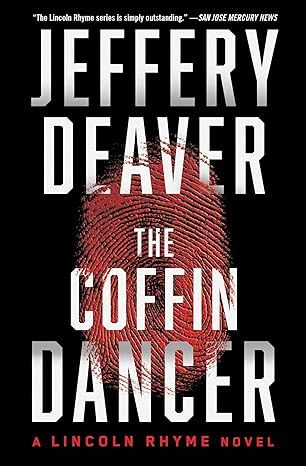
The Coffin Dancer: A Novel (2) (Lincoln Rhyme Novel)
4.5
-
5,617
$1.31
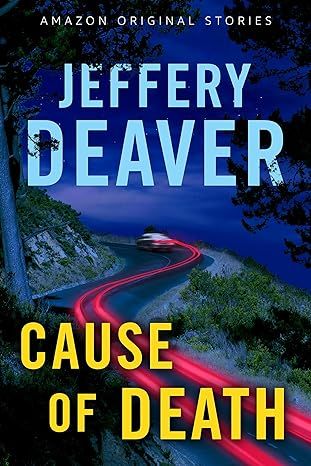
Cause of Death
4.2
-
5,166
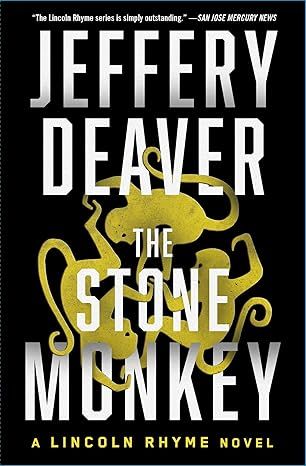
The Stone Monkey: A Lincoln Rhyme Novel (4)
4.5
-
4,802
$1.24
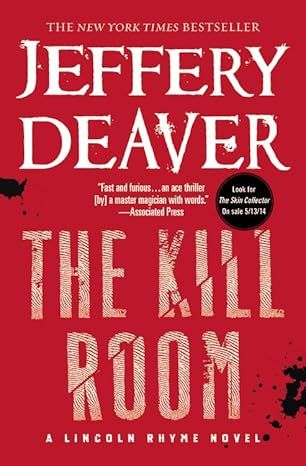
The Kill Room (Lincoln Rhyme)
4.3
-
6,193
$5.29
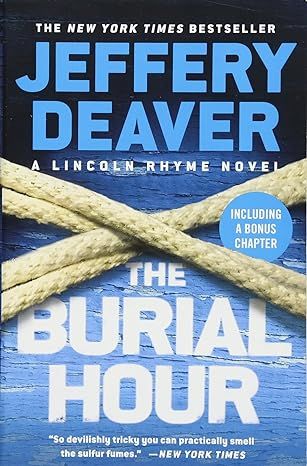
The Burial Hour (A Lincoln Rhyme Novel, 14)
4.2
-
12,268
$9.99
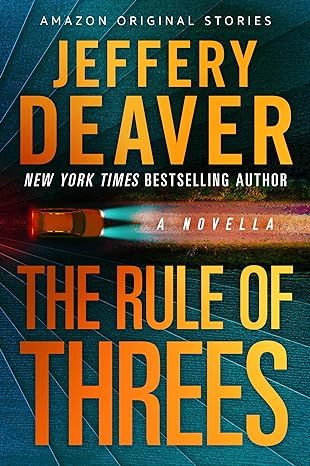
The Rule of Threes: A Novella
4
-
10,459
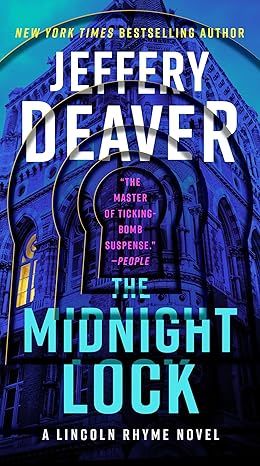
The Midnight Lock (Lincoln Rhyme Novel)
4.5
-
10,344
$2.05
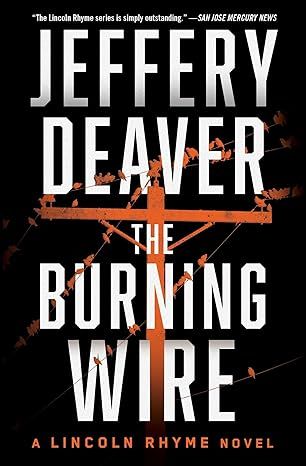
The Burning Wire (9) (Lincoln Rhyme Novel)
4.4
-
5,500
$3.99
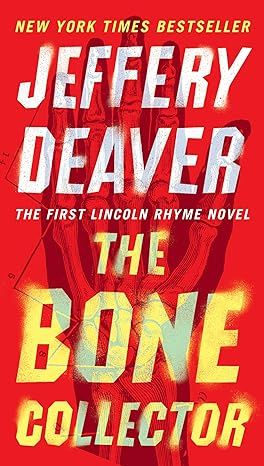
The Bone Collector (Lincoln Rhyme Novel)
4.5
-
7,183
$7.99

The Pain Hunter (The Broken Doll Book 1)
4.2
-
5,263
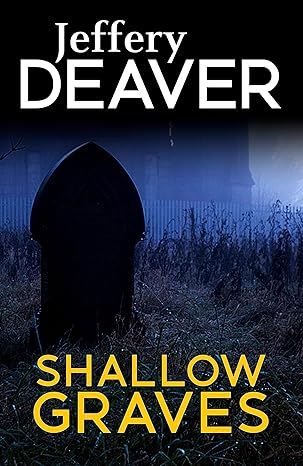
Shallow Graves
4
-
1,304
$3.82
Best Sellers
View all
The Tuscan Child
4.2
-
100,022
$8.39

The Thursday Murder Club: A Novel (A Thursday Murder Club Mystery)
4.3
-
155,575
$6.33

Sapiens: A Brief History of Humankind
4.6
-
140,302
$13.49

The Butterfly Garden (The Collector, 1)
4.3
-
88,556
$9.59

Things We Hide from the Light (Knockemout Series, 2)
4.4
-
94,890
$11.66

The Last Thing He Told Me: A Novel
4.3
-
154,085
$2.99

The Perfect Marriage: A Completely Gripping Psychological Suspense
4.3
-
143,196
$9.47

The Coworker
4.1
-
80,003
$13.48

First Lie Wins: A Novel (Random House Large Print)
4.3
-
54,062
$14.99

Mile High (Windy City Series Book 1)
4.4
-
59,745
$16.19

Layla
4.2
-
107,613
$8.99

The Locked Door
4.4
-
94,673
$8.53
